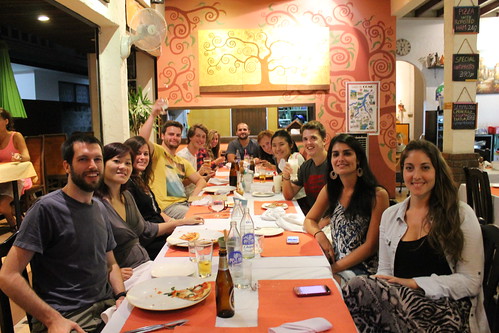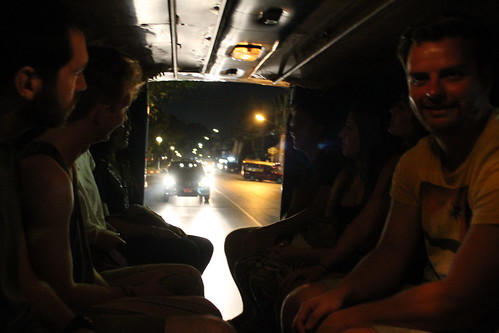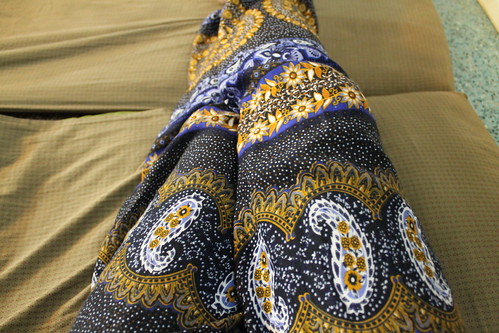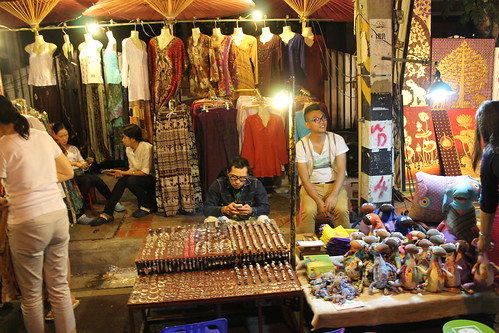I have spent the last week contemplating a pair of pants. These pants are just a length of colorful, soft fabric. The elastic waist is one-size-fits-all, and the pattern is complex but not elaborate. They are simply a pair of pants, but they bring to mind so much about our experience in Thailand and our travel thus far. But first, an overview of the first week in Chiang Mai that has sped past. So far, Steve and I have…
… watched a Muay Thai boxing fight
… visited a vast night bazaar full of clothing, bags, and food stalls
… sung karaoke (mostly Spice Girls) with a passel of fellow hostel guests
… undergone/ enjoyed an hour-long Thai massage
… watched a Thai ladyboy cabaret
… learned how to make massaman curry and hot and sour chicken soup at a Thai cooking class
… spent an afternoon reading and napping in a hammock
… had a jog along the old city walls
… enjoyed a bucket of gin and juice
… and made friends with people from a dozen different countries (Australia, Brazil, Canada, China, England, Germany, Holland, Ireland, Uruguay, and of course, US).

Compared to Taiwan, our experience in Thailand is so much more one-sided. I had not realized, until we left Taiwan, that we were able to be both insiders (understanding the language, being able to blend in sometimes) and outsiders (not understanding the history as well, finding certain customs very baffling). In Thailand, we are undeniably the outsiders and the tourists. There’s a predictable yet sad distance. We booked eight nights at a backpacker hostel teeming with so many different foreigners (or fereng, as they are called in Thai), that we even met a guy from Chicago (Lakeview!) who ran this year’s Chicago marathon. (We spent ten minutes commiserating over how terrible people look by Mile 20 or so, when they reach the stretch of 18th Street in Pilsen where we used to live.) The people who eat and sleep and drink with us are tourists here for two days to a week. Hanging out with them has been exhilarating, kind of like the first weeks of college as a freshman, as we move around the city in packs and try out new experiences together, like taking a cooking class or singing karaoke. But in the back of my head, I know that they’ll move on, and so will I.

As soon as we arrived in Thailand, we started seeing them everywhere: a pair of long, loose, uni-sex Aladdin-style pants. Many of the people we saw at breakfast sported a pair in bright gorgeous patterns, like creamy elephants on dark red backgrounds or vivid green and purple patterned peacock feathers on light brown or blue. They were gorgeous, and I wanted them badly as soon as I saw them. At home, they’d be worn for lounging around the house or going to your yoga class, but here, people wore them everywhere.

The foreigners, that is. The more I looked, the more I found that an alarming number of foreigners, whether from Europe, the Americas or China, all wore these vaguely ethnic and Southeast-Asian-vibey pants. The locals scorned them, sporting only an assortment of normal clothes (for Asians): t-shirts with English or Engrish proudly emblazoned, flannel shirts, blue jeans, all in a hodgepodge of different patterns and colors. Similar to what I’ve seen in China and in Taiwan. Nothing about what they wore screamed THAI, whereas you could practically pinpoint a foreigner from twenty paces, no matter their nationality or skin color, by their sunglasses and those pants. Thus, I call them “fereng pants.”

And in that is the uncomfortable fact about these pants. They feel like the Tibetan flags that I associate more commonly with a college dormitory than actual Tibetan temples. These pants are a casual way of appropriating another culture’s beauty and cultural offering without understanding what it really is that you’re consuming or laying claim to by wearing it. The vaguely representational symbols like elephants and peacocks, mingled with complex geometric patterns or flowers, mean nothing in and of themselves but say volumes about the desires of the people who snap them up at the market. When I tried to figure out what they were called by searching around online, I found that Amazon sold them for $29.00 under the incredible moniker of “Women’s Indian Floral Bohemian Yoga Harem Gypsy Pants.” I mean, wow, how many meaninglessly general and stereotypical adjectives do you need to describe a pair of pants?
On the other hand, I am hopelessly in love with the pair I bought the other day. I love the fabric. I love how I can wear them to bed, to lounge around the hostel, or outside. I love how the pattern hides all the stains and careless wear and tear I tend to exert on clothes, and I love that they keep me cool better than my shorts because they hide my legs from the hot sun. They just make a huge amount of sense, and they are a beautiful dark blue paisley accented with gold and black. They beat the heck out of tight, uncomfortably rough jeans and pants, and I wish they were more acceptable in mainstream Western society as something other than yoga attire.
For me, these pants exemplify how frustrated I feel in Thailand. It’s attractive to take the high road and critique what Americans tend to do when overseas with an emotional distance. We never want to be “those tourists,” and especially not those tourists wearing those pants! But at the same time, Thailand leaves me at a bit of a loss for where to begin understanding the culture and the people here. Pretty much every interaction with a Thai person has been transactional — not emotional. The waitresses or salespeople I meet talk to us out of necessity, nothing more. I’m simply a tourist, to be served and to be moved out. I’m not a real person. I practically have no idea where to start if I simply wanted to get to know a Thai person, preferably someone my age. We were able to sit on the subway with people in Taiwan and China and Japan and be with them in their daily space, but here, the red trucks or songthaews provide the only form of public transportation. And though we’re just going about our day here, just like they are, the Thai people I’ve seen on those trucks simply look past us, as though we don’t exist. Or maybe they’ve run into too many drunken twenty-somethings. Maybe they sense that we don’t really care about the subtle differences between temples and only for the curry, massages, and the beaches. Maybe they don’t really care about us at all. Even when we’re sharing a truck, we’re not sitting together at all — we’re in two different worlds.
Whatever the reason, I think there’s something lost on both sides when you look at a real person and only see the stereotype of who they are. Perhaps I just have to recognize my limitations, and take it as a humble reminder that getting to know people, much less a culture and a country, is not easy. And I don’t know what exactly I can do about it with my few mangled words of Thai. The language barrier has broadened a gulf I had forgotten about in Taiwan, and the pants are just another solid reminder that I’m on one side, and they’re on the other.
Connie
Hey! I understand your feelings, and I’m sure it must be really strange after being able to fit in much more easily in Taiwan … but I think your fereng pants are gorgeous! 🙂
I’m glad you like them! I also bought another two pairs that are both purple but differently patterned. One of them’s for my mother, and the other is for me. I can wear them to bed, I can wear them around the house, and on a good day, I can wear them outside. THEY ARE SO AWESOME.
One way you can start breaking through the tourist/local barrier is to couchsurf! I did a quick search on their website and found your profile- have you used it on your current travels yet? Staying in someone’s home can be inconvenient (though enlightening), but meet-ups can also be really great for getting to know locals who are also interested in meeting foreigners.
Thank you for the reminder! We couchsurfed in Japan, and though it was almost uncomfortably cramped, that’s where we got so many memorable stories and experiences. We met people in Taiwan at a Couchsurfing meet-up which was good. Gotta get to it here too! I’m pretty sure it’s because I haven’t felt as confident because we don’t speak the language here, but thank you for the endorsement!